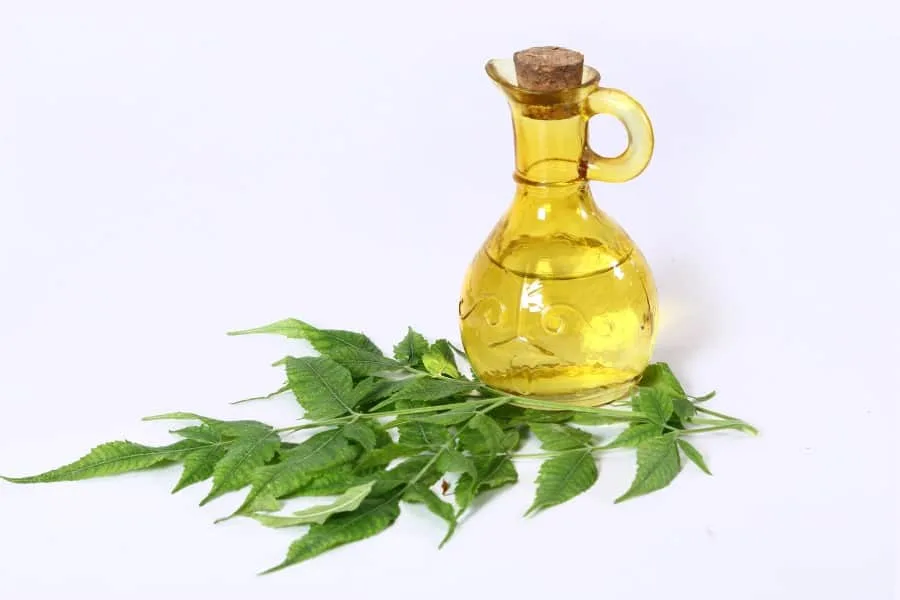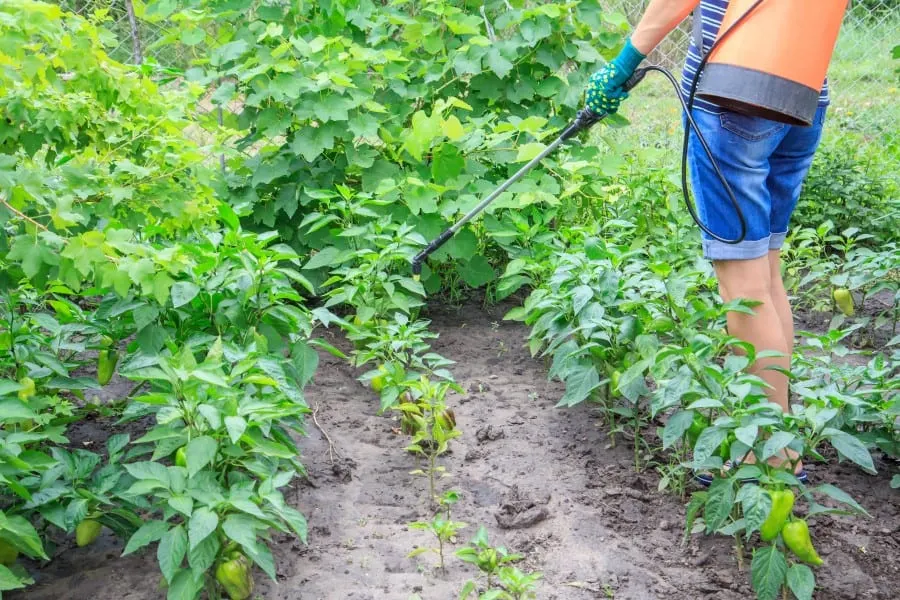Whether you farm, garden, or keep house plants, you probably worry about insects and fungal infections. Fortunately, a wide array of products is available to combat these pesky pests and infections. Chemical products may not be an effective solution for those who are eco- or health conscious. This is where neem oil can come in.
Neem oil can be used in pepper plants to naturally prevent pests and fungal infections, get rid of active pest infestations, and provide additional nutrients.
This natural oil extract from neem tree seeds found on the Indian subcontinent has been used as a natural pesticide and fungicide for millennia and is finding increasing popularity with commercial and home growers across the globe today.

Can You Use Neem Oil on Pepper Plants?
Neem oil is suitable for most plants, pepper plants included. As a natural product, it benefits from mother nature’s touch in crafting the ideal substance to deal with pests of all different kinds.
Not only is it effective in getting rid of pests, but it is also one of the safest pest control for humans and pets. When used correctly, neem oil is entirely safe for use on pepper plants and many other plants.
If you are looking for solid organic neem oil to use for your pepper plants I recommend Organic Neem Oil Bliss which can be purchased on Amazon.
As an Amazon Associate I earn from qualifying purchases.
What Does Neem Oil Do for Pepper Plants?
Neem oil works to protect pepper plants in several ways:
- Neem oil actively reduces insect feeding on plants.
- Neem oil contains organic compounds that repel pests.
- Neem oil interferes with the reproduction of pests by preventing the laying of eggs.
- Neem oil provides nutrients
- Neem oil doesn’t kill “helpful” insects, such as bees, butterflies and ladybugs.
Best of all, while neem oil targets many pest species, it is mainly harmless to our beneficial insect friends! This means that the insects who do good work can continue to do so without being disrupted by the natural neem oil.
In addition to being a pesticide, neem oil has been used as a fertilizer by farmers for centuries. So, not only are you able to keep your pepper plants pest-free, but you are also able to give them a dose of nutrients to boot.
How Fast Does Neem Oil Work?
Unlike many chemical pesticides available, neem oil does not kill on contact. Instead, the oil works by reducing the insect load on your plants over time. By reducing the number of eggs laid and repelling most insects from eating up your plants, you should see a decrease in insect activity from a few days to a week.
While you may be used to using chemical pesticides that work immediately, the benefits of using something natural are worth the wait.
Typically, when applied every two weeks, neem oil can be an effective preventative measure. It is also effective for active infestations and can be used weekly to help get rid of pests.
How Much Neem Oil to Use on Pepper Plants?
The amount of neem oil used for pepper plants varies for each manufacturer, since the concentration and any additives will change the amount needed to treat your plants. When buying a product, it is always best to follow the packaging’s directions or the manufacturer’s website.
As a rule of thumb, with a 70 percent neem oil product, two tablespoons of neem oil are added for each gallon of water. However, many home growers have found specific ratios that work for them, for particular plants. You must mix enough of the solution to cover your plants entirely.
Can Neem Oil Damage Pepper Plants?
As with most things, too much of a good thing can be harmful. However, when it comes to using neem oil, getting a little carried away will not harm your pepper plants. The beneficial properties of neem oil extend beyond its use as a fungicide and pesticide and help promote a healthy soil microbiome.
You might come across blogs that lament damages after applying neem oil to plants, but most of these tend to be an issue of overwatering, rather than the application of neem oil.
In other cases, some growers mixed neem oil with a harmful dish soap (a popular recipe online) and using a soap with acid salts can harm plants.

How to Apply Neem Oil to Pepper Plants
The most effective way to apply neem oil to your pepper plants is by making a solution of water and neem oil and using a sprayer. Several great sprayers on the market will ensure even coverage. These are available at hardware stores and online retailers.
- Gather your materials—water, neem oil, and a sprayer.
- Mix a solution as recommended by the manufacturer. Be sure to make enough to cover all of your plants.
- Add the mixture to your sprayer.
- Using the sprayer, apply an even coverage to your plants until wet. Make sure to cover the undersides of the leaves and the stem. Do not worry about getting neem oil on the soil or roots as it is harmless and even beneficial!
Some popular mixtures found online call for the use of dish soap. Although these home remedies may be effective, they are not backed by manufacturers. If you choose to proceed with these recipes, be sure to do your research and find a mixture with good results. Remember to use the correct type of dish soap as some soaps will harm your pepper plants’ delicate leaves.
How Often to Spray Neem Oil on Pepper Plants?
The frequency with which you need to spray neem oil on your plants depends primarily on two factors: are you using neem oil as a preventative measure, or are you trying to remove an active infestation? Time frames may be specified per manufacturer, but here are general recommendations.
- Preventative measure: To prevent any potential infestations from either insect or fungi, spray your plants every two weeks. Pick a day and time (preferably early morning or evening) and keep to this schedule.
- Active infestation: These infestations require patience. First, remove as many of the pests as possible, then spray as thoroughly as you can. Try to keep to a weekly schedule. Once the infestation clears up, you may want to switch to a bi-weekly (every two weeks) plan.
It is important to water in the early morning or evening. Watering at these times will prevent the water droplets from concentrating sunlight onto the leaves and burning them. Watering too late in the evening does not allow the leaves to dry before nightfall.
Do You Need to Rinse Neem Oil Off Pepper Plants and Peppers Before you Eat Them?
Neem oil, like all things, can be harmful at high concentrations. However, in concentrations used for pest control, the oil is harmless. Indeed, neem oil is one of the least toxic pesticides available, and low exposure of it to your pepper plants is harmless.
Furthermore, neem oil breaks down in sunlight and due to microbial activity, and therefore is present in low concentrations (hence the need for reapplication). Regardless, it is good practice to rinse the peppers before consuming them. For additional precautions, you can buy safe soap for veggies for that extra clean!
Can Neem Oil Kill Pepper Plants?
Neem oil used as directed is entirely safe for pepper plants. When complications arise, these are generally due to overwatering or not applying the oil at the correct time of day. By following the directions outlined by manufacturers and advice found online, your pepper plants will thrive.
The great thing about this organic pest control method is that it has so many upsides. Instead of harming plants at high concentrations, neem oil acts as a fertilizer and soil conditioner.
Here are Some of my Favorite Gardening Products and Tools
Thank you for reading this article. I hope you found it helpful for growing some new plants in your home or garden. Here are some products I like that I hope you’ll also find helpful. These are affiliate links, and I am compensated for referring traffic. But in all honesty, these are the exact product that I use or recommend to everyone.
Soil: For high-quality soil, I really like Fox Farm Ocean Forest. I do all my growing in containers and this soil has worked great for me. I like how they use nutrient-rich contents like earthworm castings, bat guano, and composted crab and fish.
Fertilizer: Currently I am using a seaweed-based organic fertilizer call Neptunes Harvest. This is a great milder fertilizer option if you want to use something organic. If you want a more powerful fertilizer, I recommend Fox Farm Liquid Nutrient Trio, lots of people have had great growing success with this product.
Pruning Shears: Pruning shears are one of the most useful gardening tools to have because it’s important to prune your plants to keep them healthy. The pruning shears I recommend are the Gonicc 8’’ pruning shears. I like them because they are built sturdy and work both on bigger and smaller plants, so you don’t need to have multiple pruning shears.
spicytrio.com is a participant in the Amazon Services LLC Associates Program, an affiliate advertising program designed to provide a means for sites to earn advertising fees by advertising and linking to Amazon.com. spicytrio.com also participates in affiliate programs with other sites. spicytrio.com is compensated for referring traffic and business to these companies.
